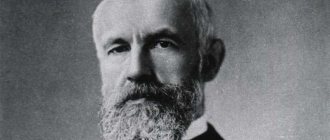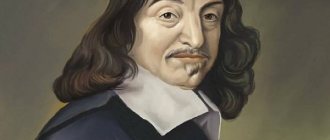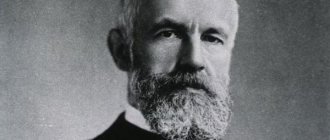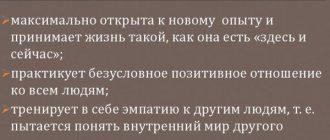Wilhelm Wundt
(1832 - 1920) - an outstanding German psychologist and physiologist, who actually became the founder of psychology as such. Wundt introduced into science an objective study of mental phenomena by analogy with other natural sciences, and showed the physiological relationship between the psyche and the brain; However, Wundt combined an objective approach to psychology with introspection, a method that was later recognized as unscientific.
Brief biography of the scientist
Wilhelm Wundt was born in 1832 into the family of a pastor. He graduated from the local school in 1851. He continued his studies at the University of Tübingen.
After receiving his diploma, he studied for a very short time with the famous German biologist Johann Muller. In 1858, he became an assistant to Hermann von Helmholtz and began giving lectures, during which he never tired of talking about the importance of using experimental methods in the study of psychology. His lectures were later compiled and published as a book, Lectures on the Mind of Man and Animals. Wundt began research that later resulted in the main work of his life, “Principles of Physiological Psychology.” In it, he described a method of studying psychology that was popular at that time - the method of introspection, thus becoming one of its founders. In 1875, Wilhelm Maximilian took up the position of professor of philosophy at the University of Leipzig. After 4 years of work, he decided to leave and founded the first psychological laboratory. (It’s interesting that one of Wundt’s students was our compatriot Ivan Pavlov.)
Wundt left behind an enormous scientific legacy - more than 50 thousand pages of articles and books.
Connection between brain and mind
Beginning in 1867, Wilhelm Wundt gave the first and only course of lectures on physiological psychology in the world at that time at the University of Heidelberg. In his course, he emphasizes the connection between the brain and the mind. Wund's knowledge and experience in physiology were of great importance for the formation of a new science - psychology. Wundt viewed it as a science that helps to understand the inner life of a person and, based on this knowledge, manage it. Tasks of psychology:
- identify the original elements through analysis;
- establish the nature of the connection between them;
- find the laws of this connection.
The lectures went down in history in the form of one of his most significant books, “Fundamentals of Physiological Psychology” (1873, 1874), which was reprinted six times.
Contributions to the study of psychology
Wilhelm Wundt became one of the first preachers of experimental psychology. He made human consciousness - its contents, processes and states - the main subject of his study.
The contents of consciousness, according to Wundt, include fleeting sensations, images of objects, desires, memories, emotions, etc.
Processes are divided into two types:
- Involuntary. They happen on their own. For example, when you are traveling on a train, the sound of the wheels seems to form a certain rhythm on its own.
- Arbitrary. Directed by a person. That is, if you wish, you can change this rhythm.
Also, the German psychologist was the first to introduce the concept of the volume of consciousness (the number of impressions that it can hold in itself at the same time) and concluded that this volume is not limited if the content is constantly combined into larger and larger units.
Strange case
While studying in Heidelberg with Professor Gasse, Wilhelm Wundt worked as an assistant in the women's department of a local clinic, which was headed by the professor himself. Due to the lack of money, the student had to be on duty for days, he was so tired that it was difficult to wake him up to visit the sick.
One day a funny thing happened. At night, Wundt was awakened to examine a delirious patient with typhus. Wundt went to her in a half-asleep state. He performed all actions mechanically: he talked with the nurse, examined the patient, and made appointments. As a result, instead of a sedative, the young assistant gave the patient iodine (at the time it seemed to him that it was a sedative). Fortunately, the patient immediately spat it out. Wundt realized what had happened only when he returned to his room. The half-asleep state in which he acted gave him no rest. In the morning he told everything to the professor and only then calmed down a little. But this incident made a very deep impression on the young man. Remembering his feelings, Wundt came to the conclusion that his perception then differed from reality: the distances seemed greater, the words were heard as if from afar, but at the same time, he perceived everything correctly auditorily and visually.
Wundt compared his state to a faint state and described it as a mild degree of somnambulism. This incident prompted Wilhelm Wundt to give up his career as a doctor. The future scientist spent a semester in Berlin, where he studied under the guidance of I. P. Müller; in 1856, in Heidelberg, Wundt defended his doctoral dissertation.
Method of studying psychology
In his research, Wundt used the method of introspection (self-observation), which is rejected by modern psychology due to excessive subjectivity. What was the essence of the method? Wundt and his colleagues (specially trained in introspection) observed themselves in various situations and compiled a report in which they described how they felt and how they behaved when stimuli appeared. Here is a clear example of how the method was applied. The subject was given a large red apple. But he could not write in the report: “They gave me an apple. It was big and red." He needed to dig deeper: “First I felt the red color of the apple. Then I felt its roundness and size. Then a slight tickling sensation appeared in the tongue - apparently a trace of a taste sensation,” etc.
Since psychology was just in its infancy in those days, Wilhelm Maximilian decided to take chemistry, which had already been sufficiently studied and developed, as the basis of science. That is why his system is characterized by elementalism.
Lectures
Why did students love attending Wundt's lectures so much? Let's try to understand what their magic is. To do this, let’s turn to the memories of the great professor’s students, try to travel back more than a hundred years ago and find ourselves on the student bench in front of the author of immortal psychological works.
So... The door swings open and Wundt enters. He is dressed all in black, from his shoes to his tie. Thin and slightly stooped, narrow-shouldered, he seems much taller than his real height. The thick hair has thinned a little on the top of the head and is covered by curls raised from the sides.
Walking loudly, Wundt goes to a long table, probably for experiments. There is a small portable shelf for books on the table. The professor selects a suitable piece of chalk for a few seconds, then turns to the audience, leans on the shelf and begins the lecture.
He speaks quietly, but within a minute there is dead silence in the audience. Wundt's voice is not the most pleasant to listen to: his thick baritone sometimes turns into something similar to barking, but the fiery and expressiveness of his speech did not allow a single word to go unheard.
The lecture goes by in one breath. Wundt does not use any notes, his gaze only occasionally falls on his hands, which, by the way, do not lie still for a second: they either sort through the papers, then make some kind of wave-like movements, or help the audience understand the essence of the material, illustrating the professor’s speech.
Wundt finishes his lecture right on time. Also stooping and stomping loudly, he leaves the audience. Fascinating, isn't it?
Basic principles, pros and cons of the Wundt method
There are three basic principles of the Wundt method:
- Human consciousness is a collection of personal experiences that do not manifest themselves externally. Therefore, it must be studied through introspection.
- The psyche and consciousness (what is conscious) are one and the same.
- Consciousness is a certain number of elements interconnected associatively.
As for the advantages and disadvantages, the main advantage of the method was that a person, with the help of introspection, will better determine his feelings and characteristics than anyone else. And the main disadvantage of the method is bias, because a person can interpret observations to his advantage.
Childhood
Wilhelm Max Wundt was born on August 16, 1832 in Neckarau. He was the last, fourth child in the family. However, the first two children died in early childhood, and brother Ludwig studied and lived in Heidelberg, with his mother's sister. It turned out that Wilhelm got the role of the only child.
Wundt's father was a pastor, the family seemed friendly to many, but Wundt later recalled that he often felt lonely and sometimes received punishment from his father for disobedience.
Almost all of Wundt's relatives were well educated and glorified the family in some science. No one had such hopes for Wilhelm; he was considered frivolous and incapable of learning. This was also confirmed by the fact that the boy could not pass the 1st grade exams.
What did the psychologist study in the laboratory?
In the 20 years since the founding of the psychological laboratory, Wundt and his students conducted more than 100 experiments. Basically, they considered those problems that had already been posed by other scientists, but were not fully studied. The first series of experiments was devoted to studying the psychological aspects of hearing, vision, smell, sense of time and other senses. Close attention was also paid to experiments studying reaction times. Wundt found that the human reaction to a stimulus can be divided into 3 stages:
- Perception of the stimulus.
- Awareness of the stimulus.
- Manifestation of will.
After exposure to a stimulus, a person perceives it, analyzes it and finally reacts. The reaction represents the movement of the muscles, and Wundt wanted to find out its average value. However, he was unable to do this, because... it was difficult to distinguish between the stages of the reaction. Another object of study by the psychologist was what we now call the focus of attention. An example of focus is the perception of the page that you now see in front of you. While you are reading one paragraph, others are not so clearly visible. Wilhelm Maximilian, among other things, wanted to take up the study of child psychology, but did not conduct experiments, because children were unlikely to be able to accurately describe their internal state and sensations.
Professor of Psychology Wundt
In 1875, Wundt received a professorship at the University of Leipzig, where he would remain for the next 45 years. Wundt was the supervisor of 186 students who defended their doctoral dissertations in various scientific disciplines. Among them are such famous names as Edward Titchener, Ivan Pavlov, Stanley Hall, James Cattell. Subsequently, they will make a serious contribution to the development of psychology in the USA, Russia, Japan, and Italy.
In 1879, Wilhelm Wundt founded the world's first psychological laboratory and brought together scientists from all over the world under one roof. First of all, Wundt develops a set of rules for conducting experimental research:
- observers must correctly determine the moment when the experiment begins;
- observers should never lower their level of attention;
- the experiment should always be organized in such a way that it can be carried out several times;
- The experimental conditions must be suitable for changes and control of stimuli.
The subject of research was three main directions, at the intersection of which experimental psychology arose: the study of sensations and perceptions, psychophysics, and the study of reaction time. Later, two more themes were added to these themes: associations and feelings. Wundt classified the types of connections (associations) that were established in the process of studying reactions. In Wundt's laboratory, sensation thresholds and reaction times to various stimuli, including speech, were experimentally studied for the first time. The results obtained were presented by him in the main work “Fundamentals of Physiological Psychology” (1880-1881). This book became the first textbook in the new discipline of experimental psychology.
It is curious that the creator of experimental psychology was not a true laboratory worker himself. According to the testimony of his first American student J. Cattell, he did not spend more than 5-10 minutes a day in the laboratory. The method of teaching creativity in his laboratory was original. He came out to the group of students standing in front of him with a stack of sheets of paper on which experimental tasks were written, and distributed them regardless of the interests of the performers. Then he checked their reports and evaluated them himself, deciding on publication in the journal he published. More than 600 students gathered in the auditorium for each lecture.
Around Wilhelm Wundt a large international school is gradually emerging, the like of which the history of psychology does not know. Gradually, a community of researchers, workers in a new field of knowledge took shape, which had its own organizational structures - laboratories, departments, journals, societies, and, since 1899, international congresses.
History of the formation of psychology as a science
Psychology is the expression in words of what cannot be expressed in words. John Galsworthy
The formation of psychology as a science was closely connected with the development of philosophy and natural sciences. The first ideas about the psyche developed in primitive society. Even in ancient times, people drew attention to the fact that there are real phenomena, material (objects, nature, people) and non-material (images of people and objects, memories, experiences) - mysterious, but existing independently, regardless of the surrounding world.
This is how the idea of body and soul, of matter and psyche as independent principles arose.
These ideas later became the basis of fundamentally opposing philosophical directions, between which there was a constant struggle of views and approaches.
Ancient thinkers made the first attempts to find answers to the questions: what is the soul? What are its functions and properties? How does it relate to the body?
The greatest philosopher of antiquity, Democritus (V-IV centuries BC), claims that the soul also consists of atoms, and with the death of the body, the soul also dies. The soul is the driving principle, it is material. A different idea of the essence of the soul is developed by Plato (428-348 BC). Plato argues that everything is based on ideas that exist in themselves. Ideas form their own world; the world of matter opposes it. Between them, the world soul acts as an intermediary. According to Plato, a person does not so much know as remember what the soul already knew. The soul is immortal, Plato believed. The first work devoted to the soul was created by Aristotle (384-322 BC). His treatise “On the Soul” is considered the first psychological work.
This is how the historically first stage of the formation of psychology as a science of the soul took place.
By the beginning of the 17th century, when mechanics and some areas of mathematics and natural sciences had already received significant development, the methodological prerequisites for understanding psychology as an independent branch of knowledge were laid. The psychology of the soul is being replaced by the psychology of consciousness. The soul begins to be understood as consciousness, the activity of which is directly related to the work of the brain. Unlike the psychology of the soul, which is based on simple reasoning, the psychology of consciousness considers introspection of one’s inner world to be the main sources of knowledge. This specific cognition is called the method of introspection (“looking inside”).
The formation of psychological views during this period is associated with the activities of a number of scientists: Rene Descartes (1595-1650), B. Spinoza (1632-1677), D. Locke (1632-1704), etc.
The further development of sciences, especially natural sciences, within the framework of which objective research methods were developed, increasingly raised the question of the possibility of objective psychological research. The research of physiologists and naturalists of the first half of the 19th century played a special role in this regard.
The evolutionary teachings of Charles Darwin (1809-1882) played a major role in this regard. A number of fundamental studies appear on the general patterns of development of sensitivity and specifically on the work of various sense organs (I. Müller, E. Weber, G. Helmholtz, etc.). Of particular importance for the development of experimental psychology were the works of Weber, devoted to the question of the relationship between the increase in irritation and sensation. These studies were then continued, generalized and subjected to mathematical processing by G. Fechner. Thus the foundations of experimental psychophysical research were laid. The experiment begins to very quickly take root in the study of central psychological problems. In 1879, the first psychological experimental laboratory was opened in Germany (W. Wund) and in Russia (V. Bekhterev), experimental work began to rapidly expand, and psychology became an independent experimental science.
The introduction of experimentation into psychology made it possible to pose the question of methods of psychological research in a new way and to put forward new requirements and criteria for being scientific. During this period, psychological concepts such as “soul”, “conscious and unconscious” are defined, some scientific concepts arise and, nevertheless, this period is often called a period of open crisis.
There were many reasons that led psychology to a crisis: the separation of psychology from practice, the use of introspection as the main method of scientific research, the inability to change a number of psychological problems. Many theoretical positions have not been well substantiated and confirmed experimentally.
The crisis led to the collapse of established psychological views. And it was during this period that new directions began to take shape, which played an important role in the development of psychological science. Three of them are most famous: behaviorism, psychoanalysis, and Gestalt psychology.
The subject of general psychology is the features and mechanisms of functioning of the psyche. In the process of the formation of psychology as a science, the dynamics (changes) of the subject of psychology occurred.
First stage. Antiquity - the subject of psychology is the soul. During this period, two main directions emerged in understanding the nature of the soul: idealistic and materialistic. The founders of the idealistic direction were Socrates and Plato (the soul is an immortal principle; it is a particle of the universal cosmos or the world of absolute ideas, a perishable body. The materialist direction in the understanding of the soul was developed by Democritus, Anaxagoras, Anaximenes, the school of the Stoics. The main idea is that the soul is material, consists of atoms Aristotle is considered the founder of psychology, who in his work “On the Soul” summarized the knowledge available at that time about the soul, understanding by this the way of organizing a living body, he identified three types of soul: the vegetable soul, the animal soul and the rational soul.
Second stage XVII - XIX centuries. – the subject of psychology becomes consciousness. Consciousness was understood as a person’s ability to feel, remember, and think. In the 17th century, the works of R. Descartes played a major role in changing the subject of psychology. He was the first to identify a psychophysical problem, i.e. relationship between soul and body. He introduced the concept of consciousness and reflex. The main method of studying consciousness was intraspection; this method was developed by J. Locke.
19th century – Wilhelm Wundt. His approach was called structuralism, because Wundt considered the main task of psychology to be the study of the structure of consciousness. Wundt is considered the founder of experimental psychology. Wundt and his colleagues identified 3 main components of consciousness: sensations, images and feelings.
American psychologist William James founded another direction in the study of consciousness - functionalism (purpose). He considered the task of psychology to be the study of the functions of consciousness. He considered adaptation to be the main function of consciousness.
The third stage 1910-1920 - USA - behaviorism emerges. J. Watson is considered the founder of behaviorism. Behavior becomes the subject of psychology. Watson expressed the essence of behaviorism in the formula S > R, where S is external stimuli, R is response or behavior. Classical behaviorism denied the role of consciousness in behavior. It was believed that in the formation of behavioral skills consciousness does not play any role, and skills are formed through mechanical repeated repetition of the same action. Classical behaviorism does not deny the existence of consciousness. In the 60s, sociobehaviorism emerged from classical behaviorism (A. Bandura) - the very important role of cognitive structures, in particular the processes of perception of memory and thinking, was noted.
The fourth stage 1910 - 1920 - Europe. The subject of psychology becomes the psyche. Various psychological trends and schools are emerging.
Psychoanalysis - founder S. Freud. The subject was the connection between consciousness and the unconscious. Freud described the structure of the psyche in his theory of the unconscious and was the first to describe the structure of personality: the preconscious; consciousness; unconsciousness. The contents of the unconscious almost never pass into consciousness; the personality’s defense mechanisms prevent this. But sometimes, in a distorted form. this content may manifest itself (for example in dreams or slips of the tongue).
From classical psychoanalysis in the 30-60s of the 20th century, two main directions emerged: depth psychology (K. Jung) and analytical psychology (A. Adler). Jung created a theory of the collective unconscious, in which he described the structure of the psyche. He identified three components: Collective unconscious or archaic psyche. The personal unconscious, which includes repressed traumatic experiences, thoughts, etc. It is formed in personal experience. Consciousness is those structures that allow you to perceive, realize, remember and analyze incoming information. Jung described the archetypes that a personality has - these are the archetypes: Persona and Shadow, Anima and Animus, Self.
Adler's position. In Adler’s concept, one of the key concepts is the inferiority complex, which significantly affects personal development and self-actualization of the individual. (Someone else's abstract)
Ideas about the soul as a subject of psychology.
Ancient psychology is a system of views on the psyche that developed within the framework of philosophical teachings about the soul.
Primitive understanding of the soul: this is a particularly subtle material object (beginning), which is connected to the body, but is capable of being separated from the body. The soul was attributed a voice, a visible appearance, insignificant weight, and the ability to quickly move in space. Loss of consciousness, fainting – temporary separation of the soul from the body. Death is the departure of the soul from the body.
In antiquity there was no single doctrine about the soul. Two main directions in understanding the essence of the soul: materialism (Leucipus, Democritus, Epicurus, Lucretius, Stoics) and idealism (Plato, Aristotle).
- Democritus The soul is the cause of the movement of the body. The soul is material and consists of small round, especially mobile atoms scattered throughout the body. The soul is a product of the distribution of atoms. The soul is mortal. Its renewal occurs with each breath (some atoms enter, some leave the body).
Panpsychism - the soul belongs to everyone, even dead bodies. Humans have the most soul atoms, but stones also have them.
Disease is a change in the proportion of atoms.
In the sense organs, small atoms are closest to the outside world, so they are adapted to external perception. There is a particularly favorable ratio of light and heavy atoms in the brain; it is the seat of higher mental functions and the ability to cognition. The organ of noble passions is the heart, of sensual desires and lusts - the liver. The soul does not exist outside the body. She herself is a special body. If the soul moves the body, then it itself is corporeal, because the mechanism of action of the soul on the body was thought of as a material process like a push.
Development of the ideas of Democritus from Epicurus and the Stoics.
Epicurus - only those creatures that can feel can have a soul.
The Stoics identified eight parts of the soul: the controlling principle (in humans - reason, in animals - instinct); vision (pneuma extending from the control part to the eyes); sense of smell; hearing; touch; taste; reproductive pneuma, extending from the control part to the reproductive organs; voice.
Original work:
History of the formation of psychology as a science
Who founded the first psychology laboratory?
Initially, psychology had its roots in philosophy and physiology. According to most psychological historians, it was the creation of the first experimental psychological laboratory that officially marked the beginning of psychology as a separate discipline. So, when exactly was the first psychology laboratory created and who was responsible for this important event in the history of psychology?
Personal life
The personal life of the professor is almost unknown to anyone today. The biography of Wilhelm Wundt was of interest to everyone from the point of view of his contribution to science. This is how an extraordinary personality is lost behind the curtain of the profession.
Wilhelm Wundt was very modest, unpretentious in everyday life. Everything in his life was clearly ordered, as evidenced by the diaries of his wife, Sophie Mau:
- Morning - working on manuscripts, getting acquainted with new publications, editing the magazine.
- Noon - work at the university, visiting the laboratory, meeting with students.
- The second half of the day is a walk.
- Evening - receiving guests, talking, playing music.
Wundt was not poor, his family lived in prosperity, and there were servants. Guests were always welcome in his house.








